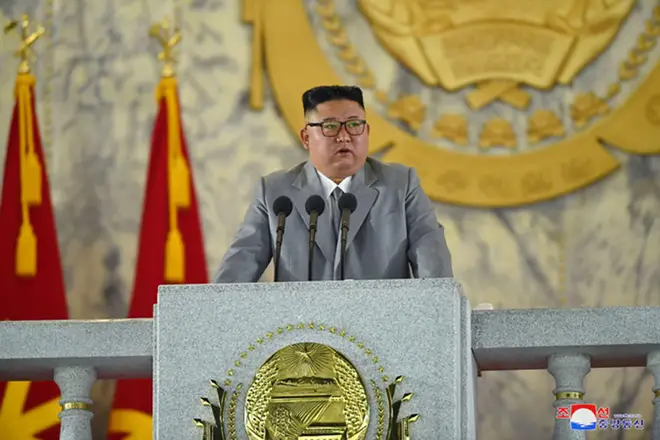
Richard Spurr 1am - 4am
4 October 2022, 09:16 | Updated: 4 October 2022, 09:19

North Korea has fired a ballistic missile over Japan for the first time since 2017, with residents warned to take cover and a temporary suspension of train services in northern Japan.
The missile appears to have flown over and past Japanese territory before falling into the Pacific Ocean.
Tokyo said the distance it covered - around 2,800 miles - may have been the longest for a test flight by the authoritarian state.
More often, tests are "lofted" higher into space, so as to avoid flying over neighbouring countries.
Read more: North Korea ‘fires ballistic missile’ toward South Korea’s eastern waters
Read more: North Korea criticised after fourth round of missile testing in a week
Tokyo said it took no steps to shoot the missile down.
It's the first North Korean missile to follow such a path for five years, and was the East Asian country's fifth launch in 10 days, amid military muscle-flexing by the United States, South Korea and Japan, Reuters reported.
Recent tests have been met with relatively muted responses from the United States, which is focused on Russia's invasion of Ukraine as well as other domestic and foreign crises, but its military has stepped up displays of force in the region.
Defence Minister Yasukazu Hamada said Japan wouldn't rule out any options, including counterattack capabilities, as it looks to strengthen its defences after repeated missile launches from North Korea, while South Korea also said it would increase allied cooperation and boost its military.
The US has said it strongly condemns North Korea's "dangerous and reckless" decision to fire a long-range ballistic missile over Japan.
"This action is destabilising and shows the DPRK's blatant disregard for United Nations Security Council resolutions and international safety norms," National Security Council spokesperson Adrienne Watson said in a statement, using the initials for North Korea's official name.
US Secretary of State Antony Blinken had phone calls with his South Korean and Japanese counterparts in which they "strongly condemned" the latest test.
The military exercise violates U.N. Security Council resolutions, which have imposed sanctions over Pyongyang's missile and nuclear programmes.
South Korean President Yoon Suk-yeol called the test "reckless" and said it would bring a decisive response from his country's military, its allies and the international community.
Japanese Prime Minister Fumio Kishida called the neighbouring country's actions "barbaric", and said the government would continue to gather and analyse information.
Daniel Kritenbrink, the top U.S. diplomat for East Asia, said the launch was "not a productive path forward" but that Washington remained open to talks.
South Korean defence minister, Lee Jong-sup, told parliament that the North had concluded preparations for a nuclear test around May. He said if there is a test, it might use a smaller weapon meant for operational use, or a device with a higher yield than in previous tests.
Lee said it was hard to predict when North Korea would conduct its next nuclear test, but lawmakers briefed by intelligence officials last week said that it could take place between China's Communist Party Congress this month and the US mid-term elections in November.
Kritenbrink said the nuclear test was like to waiting on "a political decision to do so," warning such a "dangerous" action would represent "a grave escalation that would seriously threaten regional and international stability and security."